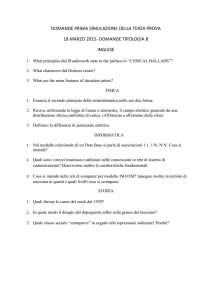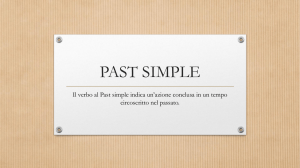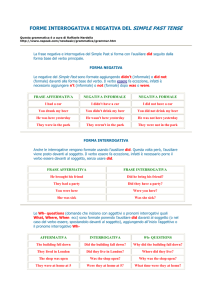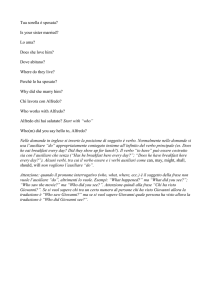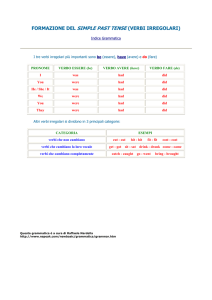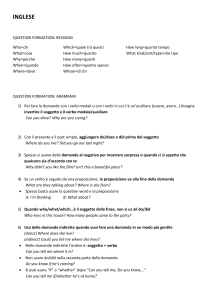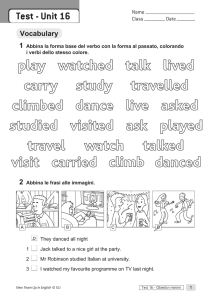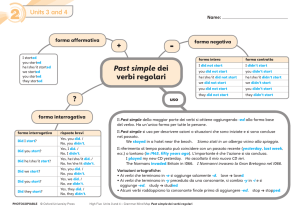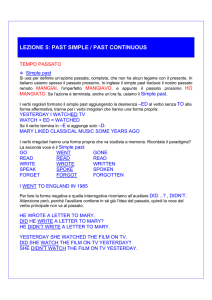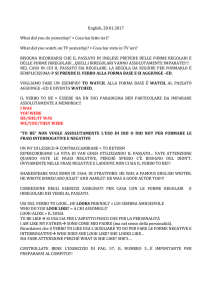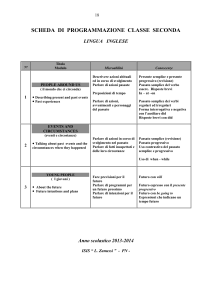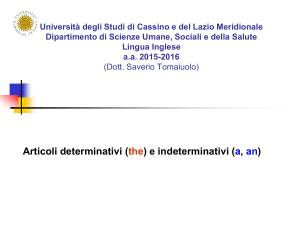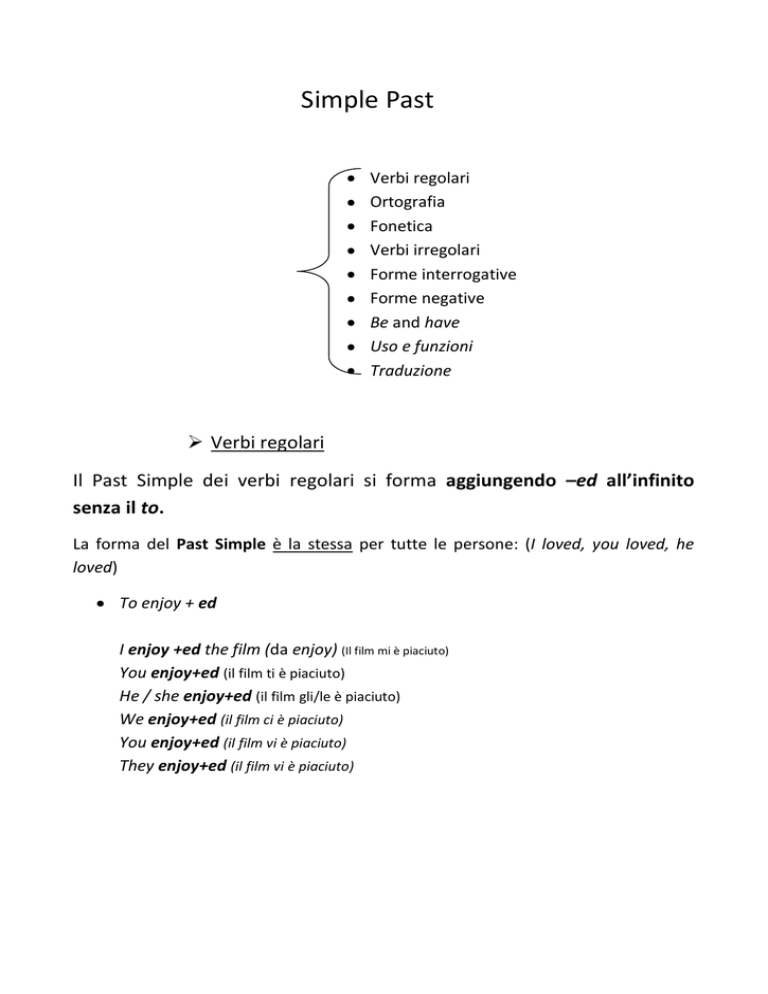
Simple Past
Verbi regolari
Ortografia
Fonetica
Verbi irregolari
Forme interrogative
Forme negative
Be and have
Uso e funzioni
Traduzione
Verbi regolari
Il Past Simple dei verbi regolari si forma aggiungendo –ed all’infinito
senza il to.
La forma del Past Simple è la stessa per tutte le persone: (I loved, you loved, he
loved)
To enjoy + ed
I enjoy +ed the film (da enjoy) (Il film mi è piaciuto)
You enjoy+ed (il film ti è piaciuto)
He / she enjoy+ed (il film gli/le è piaciuto)
We enjoy+ed (il film ci è piaciuto)
You enjoy+ed (il film vi è piaciuto)
They enjoy+ed (il film vi è piaciuto)
Con i verbi terminanti in –e si aggiunge solo –d.
To love
I love+d the music (da love) (La musica mi è piaciuta molto)
Ortografia
1) I verbi in –y preceduta da consonante cambiano la –y in –i, e aggiungonoed:
to try
tried
to cry
cried
to carry
carried
Se la –y fosse preceduta da vocale si aggiunge direttamente -ed:
to play
played
2) I verbi monosillabici che terminano con una sola consonante preceduta da una
sola vocale raddoppiano la consonante finale:
to fit
to stop
fit+t+ed (andar bene, adattare)
stop+p+ed
to clean
cleaned
3)I verbi bisillabici (o polisillabici) che terminano con una sola consonante preceduta
da una sola vocale raddoppiano la consonante finale solo nel caso in cui si tratti di
parole ossitone (in cui l’accento cade nell’ultima sillaba): (except w or y):
to regret
to refer
to prefer
to permit
to re.Igret regretted (rammaricarsi di)
to re.Ifer
referred (riferire)
I
to pre. fer preferred (preferire)
to per.Imit permitted (permettere)
Nei seguenti casi non vi è raddoppiamento:
to offer
to Iof.fer
offered (offrire)
I
to repeat
to re. peat repeated (ripetere)
to remember
re.Ime.mber remembered (ricordare)
I
to fashion
fa.shion
fashioned (modellare)
to allow
to al.Ilow
allowed (permettere, concedere)
4)I verbi che terminano con una -l preceduta da vocale raddoppiano la –l
finale, a prescindere dall’accento:
to travel
to cancel
to Itra.vel
to Ican.cel
travelled
cancelled
Nel caso seguente non c’è alcun raddoppiamento della –l:
to boil
boiled
o In British English, -l is doubled in the Past Simple even if the vowel is not
stressed: travel travelled
Fonetica
Il suffisso –ed del Simple Past può essere pronunciato in tre
diversi modi:
[d]
[t]
[id]
A) [d] dopo foni vocalici e dopo consonanti sonore (eccetto [d]):
[ð] (then); [b] (blue); [v] (valid); [z] (rose); [g] (give); [m] (moon); [n] (nine);
[ʒ] (massage); [
] (George), [l] (lamp);
to use
to try
to fail
to judge
to phone
to move
to cycle
to massage
used;
tried;
failed;
judged;
phoned;
moved;
cycled
massaged
B) [t] dopo i verbi che terminano con una consonante sorda (eccetto[t]):
[θ] (think); [p] (play); [f] (laugh); [s] (sun), [k] (cage); [∫] (shame), [t∫]
(China);
to stop
to pass
to laugh
to watch
to kick
to wash
stopped,
passed,
laughed;
watched;
kicked;
washed;
C) [id] dopo I verbi che terminano con [d] (dance)e [t] (time):
end
start
want
land
defend
ended;
started;
wanted;
landed;
defended; ecc.
Verbi irregolari
Eat ate (Past simple)
eaten (participio passato)
Drink
drank (Past simple)
drunk (participio passato)
Wake
woke (Past simple)
woken (participio passato)
Read [Ri:d] read [Red] (Past simple)
read [Red] (participio passato)
Forma affermativa del Simple Past
SOGGETTO + VERBO all’INFINITO + –ed
I opened the door (da to open)
(Ho aperto la porta)
I enjoyed the film (da to enjoy)
(Il film mi è piaciuto)
I loved the music (da to love)
(La musica mi è piaciuta molto)
Forme interrogative
Le forme interrogative yes/no si formano con:
l’ausiliare DID + SOGGETTO + INFINITO senza il to:
Domande totali (yes/no)
Did I enjoy?
Did you enjoy?
Did she enjoy?
Did we enjoy?
Did you enjoy?
Did they enjoy?
Did you enjoy the film? Yes, I did/ No, I didn’t (I did not).
NOT: Enjoyed you the film?
NOT: Did you enjoyed the film?
(Ti/vi è piaciuto il film?)
Did you drink all the milk? Yes, I did/No, I didn’t.
NOT: Drank you all the milk?
NOT: Did you drank all the milk?
(hai/avete bevuto tutto il latte?)
Did you open the door? Yes, I did/no, I didn’t.
NOT: Opened you the door?
NOT: Did you opened the door? (Hai aperto la porta?)
Domande specifiche (wh-)
Wh- + DID + SOGGETTO + INFINITO senza il to
Why did I open the door?
Why did you open the door?
Why did she/he open the door?
Why did we open the door?
Why did you open the door?
Why did they open the door?
What did you do yesterday? I went to the cinema. (
(Che cosa hai/avete fatto?) (Sono andato al cinema)
Why did she leave? Because she was in a hurry.
(Perché è partita/se ne è andata?)
Non viene impiegato l’ausiliare interrogativo did quando Who/what/,
ecc. fungono da soggetto della frase:
Who played the piano last night? John Carin played the piano last night.
NOT: Who did he play the piano last night?
(Chi ha suonato il pianoforte la scorsa notte?)
What happened yesterday? An accident happened yesterday.
NOT: What did it happen yesterday?
Esercizio:
1) Who (to invite) last night?
2) Who (to invite) last night ?
(S)Who invited you last night? (S)Jessica invited me last night.
(C)Who did you invite last night? (S)I invited (C)Jessica last night
Forma negativa
Le forme negative si formano con:
SOGGETTO + DID + NOT + INFINITO senza il to.
I did not open the door. (non ho aperto la porta)
You did not open the door.
She /he did not open the door.
We did not open the door.
You did not open the door.
They did not open the door.
Nel parlato spontaneo, non sorvegliato e nei testi informali did not si
contrae in didn’t:
The coat didn’t fit me. NOT: The coat fitted not me. NOT: The coat did not
fitted me. (Il cappotto non mi andava bene)
Carol didn’t eat very much. NOT: Carol ate not very much. NOT: Carol did
not ate very much.
(Carol non ha mangiato molto)
I didn’t open the door. NOT: I opened not the door. NOT: I didn’t opened the
door.
IL Past simple del verbo be (essere)
Il verbo be (essere) è irregolare. Il paradigma è: be (infinito)
was/were (Past Simple) been (participio passato).
Le voci del Past Simple sono:
Forma affermativa:
SOGGETTO + WAS /WERE
I was
You were
/he/she/it was
We were
You were
they were
o It was very cold last night.(C’era molto freddo la scorsa notte)
o The shop was closed. (Il negozio era chiuso)
o Carol and Jane were at school yesterday. (Carol e Jane ieri
erano a scuola)
Forma negativa:
SOGGETTO + WAS/WERE+ NOT
I was not (wasn’t) NOT: I did not was, you did not were, ecc.
You were not (weren’t)
/he/she/it was not (wasn’t)
we were not (weren’t)
You were not (weren’t)
they were not (weren’t)
o It was not (wasn’t) very cold last night.(Non c’era
freddo la scorsa notte)
o The shop was not (wasn’t) closed. (Il negozio non era
chiuso)
o Carol and Jane were not at school yesterday. (Carol e Jane ieri
non erano a scuola)
Forma interrogative (yes/no):
Inversione VERBO SOGGETTO
Was I?
Were you?
Was he/she/it?
Were we/
Were you
Were they?
Were you at school yesterday? Yes, I was, /no, I wasn’t (Eri a scuola
ieri?. Sì, C’ero/ no, non c’ero).
Was she at the cinema last night? (Lei era al cinema ieri?)
Forma interrogative wh-:
WH+ INVERSIONE VERBO SOGGETTO
Where was I yesterday afternoon?
Where were you yesterday afternoon? (Dov’eri ieri sera?)
Where was she/he…?(dov’era ieri sera?
Where were we…? (dov’eravamo ieri sera?
Where were you…? (dov’eravate ieri sera?
Where were they…? (dov’erano ieri sera?
Why was the cinema closed? (Perché era chiuso il cinema?)
What time were they at home last night? (A che ora erano a
casa la scorsa notte?
NOT: Where did you were you yesterday afternoon?
, NOT:Why did was the cinema closed?, ecc.
IL Past simple del verbo to have (avere)
Il verbo to have è irregolare. Il paradigma è have (infinito) had
(Past Simple) had (participio passato). In genere si usa got nel
Past Simple.
Forma affermativa
Soggetto + had
I had a car when she was a student. (avevo una macchina)
You had…
He/she/it had…
We had…
You had…
They had…
Forma interrogative (yes/no)
DID + SOGGETTO + HAVE
Did I have?
Did you have?
Did he/she/it have?
Did we have?
Did you have?
Did they have?
Did you have breakfast this morning? (Hai fatto colazione questa mattina?)
Did you have a computer when you were at school? (Avevi il computer
quando eri a scuola?
NOT: Did you had breakfast this morning?
Forma interrogative (wh-)
o Wh- DID + SOGGETTO + HAVE
What did I have for breakfast?
What did you have…?
What did he/she/it have?
What did we have?
What did you have?
What did they have?
NOT: What did you had breakfast this morning?
What time did you have dinner last night? (A che ora hai cenato la scorsa
notte?)
What time did you have breakfast this morning? (A che ora hai fatto colazione
stamane?)
Forma negativa
SOGGETTO + DID + NOT + HAVE
Did you write the report yesterday? (Hai scritto la relazione ieri)
No, I did not (Ididn’t) have time. (No, non ho avuto tempo)
No, you did not (you didn’t)have time.
No, she did not (she didn’t) have time.
No, we did not (we didn’t) have time.
No, you did not (you didn’t) have time.
No, they did not (they didn’t) have time.
Il Past Simple: finished periods of time
1) Il Past Simple descrive azioni, situazioni, o stati determinati
nel passato e completamente conclusi. In linea di massima
indica un’azione A) sempre collocata in un momento
anteriore rispetto al momento presente; B) priva di legami
obiettivi con il tempo presente.
Generalmente viene impiegato con gli avverbiali di tempo
definito (es. yesterday, last weekend, three years ago, in
1970, ecc.).
o I saw Lucy yesterday.
o Tom was ill last week.
o She died three years ago.
o I saw you last when we were on holiday.
o I met Lucy in 1972.
In alcuni casi il tempo concluso è sottinteso in maniera implicita:
o Shakespeare wrote over 30 plays. (i.e. During his life. We know that he’s dead).
In altri casi ancora “the finished period of time” non è solamente implicito, ma
è interamente soggettivo:
o I saw Harry in the office today.
Questo esempio sembra contravvenire alla regola del “periodo di tempo
concluso”, poiché today, e dunque la giornata di oggi, non si è ancora conclusa.
Ciononostante, il parlante interpreta la giornata di oggi (today) come conclusa
(ad es. in riferimento esclusivo alla propria giornata lavorativa).
A) Si traduce molto spesso con il passato prossimo italiano.
I enjoyed the film we saw last night.
(Mi è piaciuto il film che abbiamo visto la scorsa notte)
We listened to some new CDs yesterday afternoon.
(Abbiamo ascoltato dei CD nuovi ieri pomeriggio)
B) Il Past Simple descrive anche situazioni abituali nel passato. In tal
caso si traduce con l’imperfetto.
Every day we got up early and went to the beach.
(Ogni giorno ci alzavamo presto e andavamo in spiaggia)
Antonio Piga

